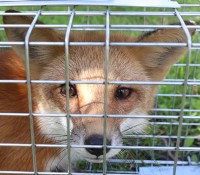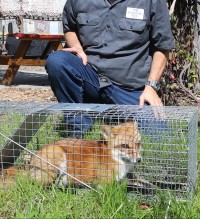| |

Call
now
to solve your Fox problems humanely.
727-710-0373
Click
here for a free estimate
Fox
The Gray Fox is native to the
Tampa Bay area. Sometimes it is
red in color and is confused with
the Red Fox, which can also be
found in our area.
Fox
are very beneficial because they
are excellent rodent predators.
They are rarely seen as they are
very secretive and often nocturnal.
Fox
can be nuisance animals if they
are being fed by humans or if
they are infected with disease
such as rabies.
Fox
can also kill some small farm
animals and pets.
Call
today to have your Fox problems
resolved!
727-710-0373
|
From
MYFWC.COM
Gray Fox
Because the gray fox
(Urocyon cinereoargenteus) frequently
has quite a lot of red hair, it may
be confused with the red fox, and is
sometimes referred to as a "red-sided
gray". The adult gray fox may weigh
from 7 to 13 pounds and measure up to
40 inches including a 12 inch tail.
The female is slightly smaller than
the male. The hair along the middle
of the back and tail is tipped in black
and has the appearance of a black mane.
The face, sides, back, and tail are
gray, while the under parts are white
and the sides of the neck and underside
of the tail a rusty-yellow color. The
gray fox is essentially a nocturnal
animal, and while seldom recognized,
it has a yapping bark. The gray fox
sometimes referred to as the "tree
fox" can scramble-up a tree quickly,
and is the only member of the dog family
capable of climbing.
The gray fox is widespread
across most of the United States except
northern plains and Rockies. While found
throughout Florida, it is much more
abundant in the northern sections. Normally
found in wooded areas, as it prefers
to live in more inaccessible cover.
Mating takes place in
January, February, or March. An average
of three to five young (pups) are born
after a gestation period of about 63
days. Pups are brownish-black and fully
furred, but blind for the first nine
days. They nurse for about two months
and stay with their parents until late
summer or fall. Both male and female
are devoted parents and provide food,
care, and training to the youngsters.
The den site may be hollow logs, gopher
holes or hollow trees.
Mice, rats and rabbits
are the mainstays of the gray fox's
diet, although it will consume almost
anything edible. All types of small
birds, mammals, reptiles, amphibians,
fish, fruits, berries, insects, and
some carrion serve to supplement the
diet. The gray fox seldom raids the
farmer's hen house, as it prefers to
live in wilder, more dense brushy cover.
While gray fox serve to maintain a balance
in the rodent and rabbit populations,
they, in turn, are preyed upon by dogs
and bobcats, and young fox may fall
to the owl, hawk, or coyote.
Major factors governing
population of gray fox are food and
cover. The foxes, both gray and red,
are subject to epizootics of rabies
|
|
|

Licensed and insured nuisance fox
trapper. Let me help
you with your Fox
trapping.
|
| 
Red
Fox
The
Trapper Guy is not a pest control
company. I do not
use poisons or service bugs.
|

|
|